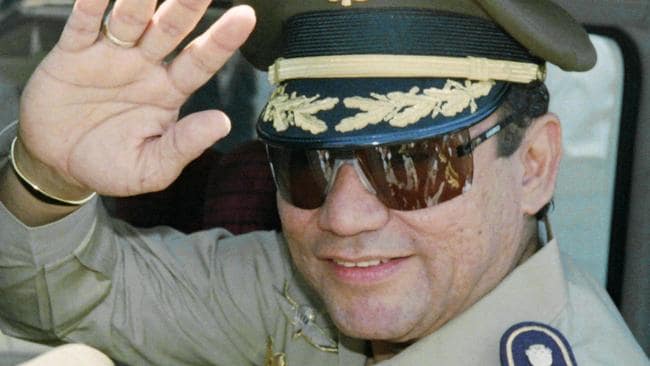Early Life and Education: Humble Beginnings
Born on February 11, 1934, in Panama City, Manuel Antonio Noriega hailed from humble beginnings. Raised in the impoverished district of Chorrillo, Noriega experienced firsthand the socioeconomic disparities that would later shape his worldview.
Educational Pursuits
Despite the challenges, Noriega's academic prowess shone through. He attended the Military School of Chorrillos, eventually earning a scholarship to the Chorrillos Military School in Lima, Peru. This early exposure to military education would become a formative influence on his future career.
Personal Life: Marriage and Family
Manuel Noriega was married to Felicidad Sieiro de Noriega. The couple had three daughters: Lorena, Thays, and Sandra. While little is known about Noriega's personal life, his family remained a private aspect amid the public scrutiny surrounding his political career.
The Elusive Private Life
Noriega was known for keeping details of his personal life guarded. The secrecy surrounding his family and personal affairs added an air of mystery to the man who would later wield immense power in Panama.
Rise to Power: Military Ascension
Noriega's military career saw a steady ascent. He rose through the ranks, becoming the head of Panama's intelligence agency and later the commander of the National Guard. His adept political maneuvering and alliances with both U.S. and Panamanian officials contributed to his consolidation of power.
Alliance with the United States
During the Cold War era, Noriega cultivated ties with U.S. intelligence agencies, offering assistance in anti-communist efforts. His collaboration with the United States initially positioned him as an ally, and he received support despite growing concerns about his authoritarian rule and alleged involvement in illegal activities.
The Dictator's Reign: Authoritarian Rule
By the 1980s, Noriega's grip on power solidified, and he effectively became Panama's de facto ruler. His regime was characterized by human rights abuses, suppression of political opposition, and allegations of involvement in drug trafficking, money laundering, and other illicit activities. He amassed a personal fortune through these illicit activities.
Tensions with the United States
As Noriega's regime became increasingly autocratic, tensions with the United States escalated. The strained relationship reached a tipping point, leading to the U.S. invasion of Panama in 1989, known as Operation Just Cause, which aimed to remove Noriega from power.
Noriega's Imprisonment and Death
Noriega was held in various U.S. prisons, including the Metropolitan Correctional Center in Miami, Florida, and the Federal Correctional Institution in Miami. Later, he was also incarcerated at the Federal Correctional Institution, Terminal Island, in California.
Manuel Noriega was transferred from a U.S. prison to Panama on December 11, 2011. After serving time in the United States for charges related to drug trafficking, money laundering, and racketeering, Noriega was extradited to Panama. Upon his return to Panama, he faced additional legal proceedings and was sentenced for various crimes committed during his rule in the country. Noriega's transfer marked the end of his incarceration in the United States and the beginning of his imprisonment in Panama until his death.
Manuel Noriega died on May 29, 2017, at the age of 83. His death occurred while he was still serving time in prison in Panama. Noriega's health had deteriorated in the years leading up to his death, and he had undergone multiple surgeries. Despite his capture and imprisonment, Noriega's legacy continues to be a subject of historical analysis and debate, particularly regarding the complex geopolitical dynamics of the time and the consequences of Operation Just Cause.
Legacy of a Complex Figure
Manuel Noriega's life is a tapestry woven with threads of ambition, secrecy, and controversy. From his humble beginnings in Chorrillo to the corridors of power in Panama, Noriega's journey is one of complexity and contradiction. His legacy remains a subject of historical analysis, with debates continuing about the factors that propelled him to dictatorship and the consequences of his rule for Panama and its people.



 RSS Feed
RSS Feed